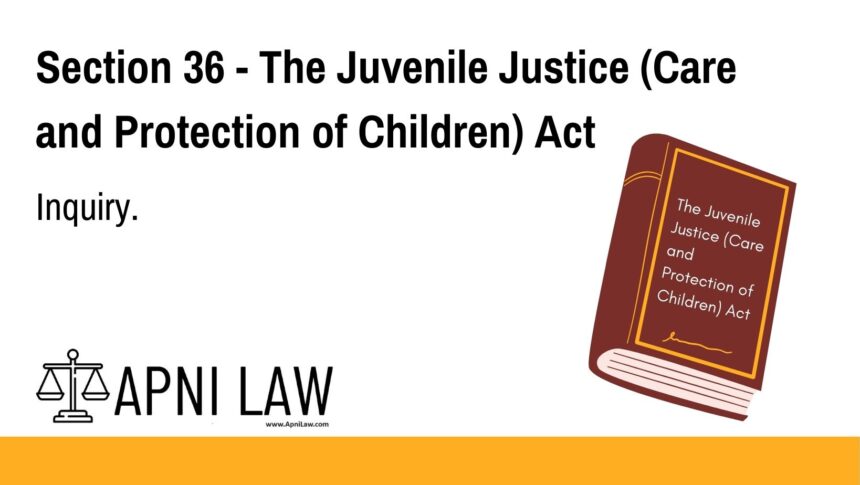Code
(1) On production of a child or receipt of a report under section 31, the Committee shall hold an inquiry in such manner as may be prescribed and the Committee, on its own or on the report from any person or agency as specified in sub-section (2) of section 31, may pass an order to send the child to the Children’s Home or a fit facility or fit person, and for speedy social investigation by a social worker or Child Welfare Officer or Child Welfare Police Officer:
Provided that all children below six years of age, who are orphan, surrendered or appear to be abandoned shall be placed in a Specialised Adoption Agency, where available.
(2) The social investigation shall be completed within fifteen days so as to enable the Committee to pass final order within four months of first production of the child:
Provided that for orphan, abandoned or surrendered children, the time for completion of inquiry shall be as specified in section 38.
(3) After the completion of the inquiry, if Committee is of the opinion that the said child has no family or ostensible support or is in continued need of care and protection, it may send the child to a Specialised Adoption Agency if the child is below six years of age, Children’s Home or to a fit facility or person or foster family, till suitable means of rehabilitation are found for the child, as may be prescribed, or till the child attains the age of eighteen years:
Provided that the situation of the child placed in a Children’s Home or with a fit facility or person or a foster family, shall be reviewed by the Committee, as may be prescribed.
(4) The Committee shall submit a quarterly report on the nature of disposal of cases and pendency of cases to the District Magistrate in the manner as may be prescribed, for review of pendency of cases.
(5) After review under sub-section (4), the District Magistrate shall direct the Committee to take necessary remedial measures to address the pendency, if necessary and send a report of such reviews to the State Government, who may cause the constitution of additional Committees, if required:
Provided that if the pendency of cases continues to be unaddressed by the Committee even after three months of receiving such directions, the State Government shall terminate the said Committee and shall constitute a new Committee.
(6) In anticipation of termination of the Committee and in order that no time is lost in constituting a new Committee, the State Government shall maintain a standing panel of eligible persons to be appointed as members of the Committee.
(7) In case of any delay in the constitution of a new Committee under sub-section (5), the Child Welfare Committee of a nearby district shall assume responsibility in the intervening period.
Explanation
Section 36 outlines the process of inquiry by the Child Welfare Committee (CWC) when a child is brought before it or reported under Section 31. It mandates a timely social investigation and empowers the Committee to take appropriate decisions for interim care and protection of the child.
The provision emphasizes placing young children (under 6 years) in Specialised Adoption Agencies and defines timelines to avoid procedural delays. It also establishes mechanisms for accountability and addresses prolonged case pendency through District Magistrate review and potential replacement of inactive CWCs.
Key Highlights
-
Mandates an inquiry upon production or report of a child.
-
Orphaned/abandoned/surrendered children under 6 must be placed in Specialised Adoption Agencies.
-
Social investigation to be completed in 15 days; final orders within 4 months.
-
Committee reviews placements and reports quarterly to District Magistrate.
-
Persistent delays may lead to Committee termination and reconstitution by the State Government.
-
Ensures continuity by using standby panels and nearby district Committees when needed.
Illustration
Example 1: A 3-year-old orphan is brought before the Committee. As per the law, he is placed in a Specialised Adoption Agency, and a social investigation is initiated within 15 days.
Example 2: A 14-year-old runaway girl with no traceable family is placed in a Children’s Home. Her placement is reviewed every quarter, and support services are initiated until a long-term plan is determined.
Example 3: Due to backlog of cases, the District Magistrate finds the CWC underperforming. Despite directives, no improvement is seen in 3 months. The State Government dissolves the Committee and replaces it with a new one from a pre-approved panel.
Frequently Asked Questions
Q1: What happens if a child below 6 years is found to be abandoned?
A: Such a child is mandatorily placed in a Specialised Adoption Agency for care and rehabilitation.
Q2: Who conducts the social investigation and how long should it take?
A: A social worker or Child Welfare Officer/Police Officer conducts it within 15 days of production of the child.
Q3: Can the CWC’s performance be reviewed?
A: Yes, the District Magistrate reviews case disposal and pendency quarterly and can recommend remedial steps.
Q4: What if a CWC fails to reduce pendency?
A: The State Government can terminate and replace the Committee after giving it 3 months to improve.
Q5: Is there a backup if the Committee is dissolved?
A: Yes, a panel of eligible persons is maintained and the nearby district’s Committee steps in if needed.
Conclusion
Section 36 serves as a procedural backbone for timely inquiry and decision-making in child protection cases. It ensures young, vulnerable children are placed in appropriate care, investigations are conducted without delay, and system inefficiencies are actively addressed by district and state-level authorities.
🔗 For more information on Juvenile Justice legal provisions, visit ApniLaw – Juvenile Justice Bare Act Sections.








